Prøve GULL - Gratis
KingTech - TURBINE K45 G3
Model Airplane News
|May 2020
The ideal engine for 10- to 12-pound jets

Today, modern technology impacts our everyday lives like never before. A single smartphone has hundreds of times more computing power than that room full of computers that got us to the moon and back. In the last few years, we RC’ers have seen the widespread adoption of 2.4 frequencies that freed us from the pin and impound days, multi-axis gyros the size of a quarter, and more.
One of the areas of our hobby that has been significantly impacted by smaller, inexpensive electronic components is jet turbines. Turbine flight has long been out of the financial reach and expertise of many modelers. In addition, turbines were complicated to set up and operate, came with a steep learning curve, and often needed butane or other external means to start them. Today, nearly every turbine is kerosene start. The electronic control unit (ECU) takes care of the entire start sequence from the time you initiate a start, and it turns over throttle control to the transmitter only when the engine reports that it has started properly and achieved stable idle rpm. If it senses any issues, the ECU will immediately shut down the engine and provide an error message to the user via radio telemetry or the ground support unit (GSU).
This brings me to the subject of this article: small turbines. Modelers with smaller electric ducted fan (EDF) jets are finding the joys of converting them to turbines. Why convert? New technology makes turbines a lot easier to install and safely operate. You also find yourself with double or better the flight time than an equivalent EDF motor. The new generation of small turbines is extremely lightweight, so a model will often weigh the same or slightly more than its EDF counterparts at takeoff, but due to fuel burn, it will land lighter. Turbines also have the same power output from takeoff to landing because there’s no drop in performance as a flight battery discharges. Oh, and they sound cool— REALLY, REALLY COOL!
Denne historien er fra May 2020-utgaven av Model Airplane News.
Abonner på Magzter GOLD for å få tilgang til tusenvis av kuraterte premiumhistorier og over 9000 magasiner og aviser.
Allerede abonnent? Logg på
FLERE HISTORIER FRA Model Airplane News
Model Airplane News
Legend Hobby / Seagull Models - Cessna Grand Caravan 208
The Cessna Grand Caravan 208 is a legend in aviation circles. A single engine utility aircraft that punches up with capabilities that rival many twin engine aircraft in its class. Its seemingly simple configuration belies its near extreme utility.
8 mins
January 2022
Model Airplane News
PROPER CG LOCATION FOR AEROBATICS
If you are getting into aerobatics and are starting to perform more advanced maneuvers, it is time to discuss ways you can not only become a better pilot, but how you can also improve the flight characteristics of your airplanes.
5 mins
January 2022
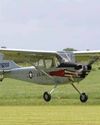
Model Airplane News
Legend Hobby 13-Foot L-19 Bird Dog/ Cessna O-1
This famous multi-mission single engine observation aircraft served from 1950-1974. From calling out target locations to providing intel/recon information, the Bird Dog was a valued asset in both the Korean War and Vietnam.
1 min
January 2022
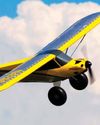
Model Airplane News
EARN YOUR WINGS
10 Tips for First-Flight Success
6 mins
January 2022
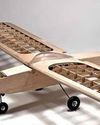
Model Airplane News
Old School Model Works Fifty Six
The Fifty Six takes its design cues from the original .09- to .15-size Carl Goldberg Falcon 56 of the 1960s. Reworked to incorporate modern, lasercut techniques to make kit building better than ever.
1 mins
January 2022
Model Airplane News
FLYING TWINS Multi-engine warbirds made easy
Let’s face it, there’s just something extra special about twin-engine RC aircraft. Most modelers stop what they’re doing when a twin fires up on the flightline.
6 mins
January 2022
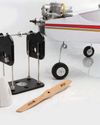
Model Airplane News
HOW TO BALANCE PROPELLERS
Four easy steps to increase performance and reduce vibration
5 mins
January 2022
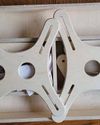
Model Airplane News
PRODUCT REVIEW: RC PLANE STANDS BENCHTOP MODEL
I’m a sucker for shop stuff. I buy tools I will probably never use just because they are cool, or I might need to use them someday. When Glen from RC Plane Stands reached out about a review, however, I knew as soon as I browsed their website that I would be receiving something I would use a lot, maybe even daily.
2 mins
January 2022
Model Airplane News
SPIRIT OF RHINEBECK AWARD WINNER
A close up of Norman Malinowski’s 1/3-scale Albatros
3 mins
January 2022
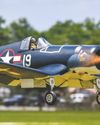
Model Airplane News
CENTER OF GRAVITY BASICS
The secret to a plane that flies well
6 mins
July 2021
Translate
Change font size
